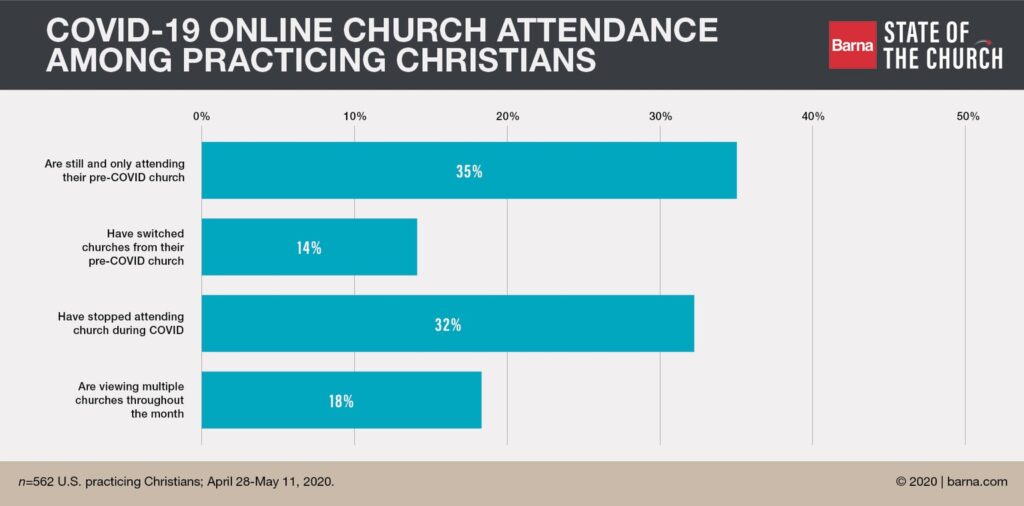
As more Christians across the country push for the re-opening of places of worship, a question is raised as to whether a digital Church service still holds its value?
According to recent surveys from Barna, one-third of practicing Christians haven’t been ‘attending’ either their home church online or streamed a differing church since congregational services were banned in response to the coronavirus.
Using data collected in late April through early May 2020 in U.S, the researchers identified a number of types of churchgoers in the digital church era:
- Christians who streamed their home church online.
- Christians who streamed a differing church.
- Christians who stopped “attending” church.
Among practicing Christians—those who identify as Christian, agree strongly that faith is very important in their lives and attend church at least monthly (prior to COVID-19)— the research found that over half (53%) have streamed their regular church online within the past four weeks.
Another 34 percent admitted to streaming a different church service online other than their own.
Notably, about one-third of practicing Christians (32%) told the research group they have done neither of these things.

This survey revealed a strong generational pattern: Exactly half of practicing Christian Millennials (50%) said they have not been attending church within the past four weeks.
“The percentages of Gen X and Boomers who have stopped attending online services (35% Gen X, 26% Boomers) are lower than among their younger counterparts, but still show the impact of COVID-19 precautions and regulations on what used to be a regular practice,” the group reported.
“These trends highlight the importance of churches continuing to reach out to and disciple the next generation, especially those who are seemingly falling away during the pandemic,” they added.
In an article published by The Gospel Coalition (Africa) on 20 March, 2020, Dr Dennis Kilama, the deputy vice chancellor of Africa Renewal University and senior Pastor of Lugogo Baptist Church in Kampala urged that many congregants left with no shepherding during the lockdown, will feed on “spiritual poison” that could cause long term destruction, long after the pandemic has ended.
Pastor Kilama stated that it is essential for pastors with congregations with limited internet access to ensure that they restructure their ministry operations including the use of telephone communication among others.
In May, Barna hosted a webcast in which the group’s President David Kinnaman emphasized how COVID-19 has accelerated the disruptions that were already in motion in society.
Among practicing Christians who have lessened or completely stopped digital worship attendance, Barna data showed that they bear more emotional burdens.
According to Barna, respondents who have stopped attending church during COVID-19 are less likely than their peers who are still attending the same church during the pandemic to agree with the statement “I am not anxious about my life, as I have an inner peace from God” (76% vs. 87%).
Practicing Christians who have stopped attending church in recent weeks are more likely than all other practicing Christians to say they feel bored “all of the time” (17% vs. 6%) or that they have felt “insecure” for at least some of each day (11% vs. 7%).
Find The Full Report Here.

